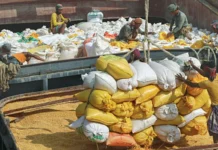
TEKNAF, Bangladesh, January 31 (UNHCR) – Along one of the world’s longest stretches of sandy beach, groups of men brace themselves every night for the adventure ahead. They roll up their longyi, a sarong-like wrap commonly worn in the region, and board boats guided by the moonlight.
They leave at midnight when the sea is calmer. Some return by the following afternoon. Others could be at sea for up to 10 days, returning with hauls of fish, crabs, shrimps and other seafood. According to a local leader in a fishing village in Teknaf in south-eastern Bangladesh, 95 per cent of the fishermen are ethnic Rohingya from Myanmar.
“This village hosts many Rohingya, between 5,000 and 10,000. Some fled here from Myanmar more than 20 years ago. They live near the beach in handmade huts. Some come from the refugee camps to work here,” said Salem,* a local politician in Teknaf.
Some 30,000 registered refugees are hosted in two official camps – Kutupalong and Nayapara – in the south-east. In addition, an estimated 200,000 unregistered Rohingya live in makeshift sites or among the local community with assistance.
While local rhetoric has focused on the burden these refugees place on an already densely-populated area, in reality they share close links with their host communities.
“Before, we could only fish in winter, during the dry season. But the Rohingya are fearless, so they can fish all year, even during the rainy season,” said Salem in Teknaf. “The locals need them. The economy depends on them.”
In return, the Bangladeshi employers provide accommodation – basic shacks with flimsy bamboo walls and plastic-sheeted roofs fenced off with used fishing nets draped over twig frames. The fishermen and their families also receive food, and salary advances if needed. If they are arrested for being unregistered, their employer intervenes to secure their release.
It seems like a win-win situation for both the Rohingya and their hosts. But there’s a catch. “When a Rohingya dies at sea, nothing will happen,” said Salem. “There is often no contract and no compensation to the family.”
The lack of a formal safety net means that when tragedy strikes, unregistered Rohingya families are often left to fend for themselves.
Aisha’s* husband fished here for 20 years. When he didn’t return one day, she thought he was dead, until she received a call 12 days later. He had boarded a smuggler’s boat for South-east Asia but was held in Thailand by the smugglers, who demanded money for his release.
Unable to pay and left alone with several children in Teknaf, Aisha is completely at sea about her future. “I will just continue my life,” she said blankly, hoping against hope that her host’s hospitality will not run dry.
*Names changed for protection reasons
By Vivian Tan in Teknaf, Bangladesh
Source: UNHCR









